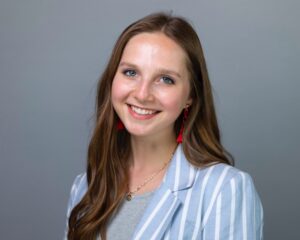Classic Western films make a point of valuing grit. They highlight the most resilient individual on the range. This person conquers the challenges of the Wild West and hangs tough when the going gets rough. Though these films are wildly historically inaccurate, they play on a value that is ingrained in the American psyche: the concept of grit.
Dr. Emily Smith, assistant professor of history, may not be saddling up anytime soon, but entering a new teaching position is not for the cowardly. A 2008 Oklahoma Christian alumni, Dr. Smith has returned to her alma mater after obtaining a doctorate in history at Oklahoma State University and teaching at Northern Oklahoma College. Now, she is armed with the knowledge of Irish and American History and seeks to be understood while impacting others on campus.
Why did you decide you wanted to teach?
“When I was here at Oklahoma Christian, I was originally going to be a librarian. I had picked history as a major … and the second semester I was here I took a U.S. history course with Dr. John Thompson. He’s since passed away, but he was one of the U.S. history professors when I was here. He was so passionate about the subject that he got me interested in it. He was also a really good mentor and he was very, very encouraging to the students, always there for them. When I saw that I decided, ‘I want to be like that.’ I switched career goals. That’s why I decided I wanted to be a history professor.”
How would you describe your teaching philosophy?
“I think that a good professor is somebody that is a good mentor for their students. They help them prepare for the class, but also for life. I try whenever possible to serve my students in that way. Even if they don’t like history, which is okay … I still want them to get something out of the class, something that they can use in later life, outside of the academic setting.”
What challenges have you had to overcome in your career?
“People’s misconceptions about me. I’m female in what in some places is still a male dominated profession. I’m short. I look young. If I’m not dressed very professionally I frequently get mistaken for a student. Probably the biggest one is my vision, not so much overcoming that but other people’s concerns about it. I am visually impaired. My vision in my left eye is about 20/80; it fluctuates. My vision in my right eye is basically light perception and that’s it. … I don’t really have any peripheral vision which is what my cane helps with. The biggest obstacle I’ve had to overcome is people being concerned about classroom management problems. … That really hasn’t been an issue. Most of my students have been great about the accommodations and things I need, like telling me who they are when they come up because it takes me a while to figure out. And the masks don’t help. So that would be the biggest challenge, the various misconceptions people have had.
Do you feel that those misconceptions led to people underestimating you?
“Yeah. Everybody here has been wonderful, but I run into situations elsewhere. … Until people get to know me sometimes they think that I have other issues besides my vision. I run into people who talk to me like I’m a whole lot younger than I am, which is not fun. It doesn’t happen too much, but I do notice when it does happen.”
How does that shape your perception of the world?
“It’s made me more accepting of people who are different themselves. I think I’m more open to people who think differently than I do on certain things. It’s made accepting other people’s differences easier. I’m also more comfortable in situations where there’s different types of people.”
What should the students of Oklahoma Christian University know about you?
“They should know that I have pretty rigorous academic standards as far as what I expect them to be able to do, but I am willing to go above and beyond to help them meet those standards. … I want them to know that I want to help them, I want to be there in that mentoring role.”
What impact do you want to make on Oklahoma Christian University?
“I would like to make a big one. I hope I have a legacy when I’ve been here for as long as Dr. Maple had been. … I would hope that I will have a reputation among the students as somebody that’s rigorous but also helpful. Somebody they believe they can go to. I would like to leave that kind of an impact.”











Be First to Comment